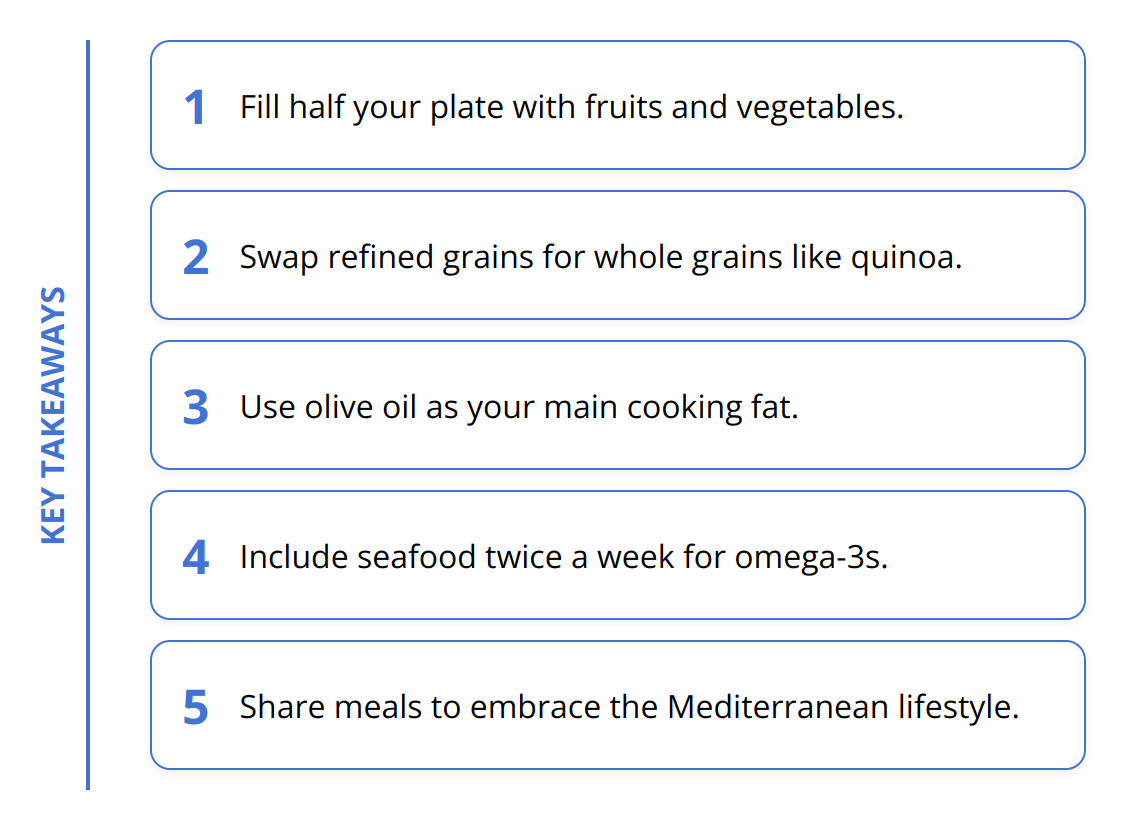Mediterranean Diet Recipes: Best Practices

The Mediterranean diet stands out for its remarkable balance of fresh fruits, vegetables, whole grains, and healthy fats. It’s celebrated not only for its health benefits, including improved heart health and weight management, but also for its rich cultural heritage.
We at Healthy Tips You Blog believe in embracing a lifestyle approach that goes beyond just dieting. This post aims to guide you through the best practices for crafting delicious Mediterranean recipes that promote a sustainable, healthy lifestyle.
Understanding the Mediterranean Diet
The Mediterranean diet is much more than a simple eating plan; it’s a philosophy that emphasizes a balanced approach to food, favoring quality and variety. This diet revolves around fruits, vegetables, whole grains, and healthy fats, forming the cornerstone of one of the world’s healthiest dietary patterns. The benefits of adopting this diet are numerous, including enhanced heart health, effective weight management, and increased longevity. It also carries profound cultural significance, encouraging a lifestyle that values mealtime as an opportunity for social interaction and enjoyment of life.
The Essence of the Mediterranean Diet
At its core, the Mediterranean diet promotes the consumption of a diverse range of nutrient-rich foods. Incorporating a rainbow of fruits and vegetables ensures a high intake of vitamins, minerals, and antioxidants. Whole grains contribute to this by providing essential fibers, while healthy fats, particularly olive oil, offer heart-healthy monounsaturated fats.
Practical Tips for Embracing This Diet
- Prioritize plant-based foods. Aim to fill half your plate with fruits and vegetables at each meal.
- Whole grains are key. Swap out refined grains with whole options like quinoa, farro, and whole wheat.
- Healthy fats are your friend. Use olive oil as your main cooking fat and enjoy nuts and seeds as snacks.
- Lean into legumes. Beans and lentils are excellent protein sources and can be used in salads, soups, and stews.
- Fish and seafood twice a week. Rich in omega-3 fatty acids, seafood is a staple protein source in this diet.
- Moderation with meat and dairy. Choose lean poultry and limit red meat intake; opt for low-fat dairy products.
- Enjoy meals with others. Embrace the cultural aspect by sharing meals with family and friends.

The Impact on Health and Wellbeing
Adopting the Mediterranean diet can lead to significant health improvements. Studies have shown that it can reduce the risk of cardiovascular diseases, manage type 2 diabetes, and even lower the likelihood of certain types of cancer. It’s also associated with a lower risk of Alzheimer’s and Parkinson’s diseases, showcasing its protective effects beyond physical health to include cognitive function.
Moreover, the Mediterranean lifestyle goes beyond nutrition, promoting physical activity and stress reduction through communal meals and relaxation. It’s a holistic approach to health that values the joys of eating and living well.
Conclusion
Transitioning to a Mediterranean diet can start with simple changes, such as increasing your intake of fruits and vegetables, choosing whole grains, and using olive oil for cooking. Embracing this diet fully means also adopting the Mediterranean lifestyle of enjoying meals with loved ones, appreciating the food on your plate, and leading an active life.
For those looking to explore this eating pattern further, starting with easy-to-follow recipes can be a great first step. Check out our guides on Mediterranean diet 101 and healthy eating habits for more information and inspiration.
Elevating Mediterranean Recipes
When crafting Mediterranean diet recipes, the focus should be on maximizing nutritional value while ensuring a festival of flavors on the plate. This strategy not only aligns with health goals but also makes each meal an enjoyable experience. Here’s how to achieve that.
The Colorful Palette of Health
Eating the Mediterranean way encourages a canvas of colors on your plate, each signifying different nutrients and antioxidants. A vibrant salad with red tomatoes, green cucumbers, and purple onions, topped with orange slices of bell peppers, not only looks appealing but is also packed with vitamins and minerals. Incorporating a variety of colors in your meals isn’t just visually stimulating; it’s a fundamental practice for absorbing a spectrum of nutrients.

The Riches of Olive Oil
Olive oil is more than just a cooking ingredient; it’s a health elixir in the Mediterranean diet. Choosing extra virgin olive oil not only adds depth and flavor to dishes but also contributes beneficial monounsaturated fats and antioxidants to your diet. Use it generously to sauté vegetables, as a base for dressings, or simply drizzled over finished dishes to elevate their taste and nutritional profile.
Plant-Powered Meals with a Seafood Boost
Prioritizing plant-based ingredients doesn’t mean skimping on protein or flavor. Incorporating legumes, nuts, and seeds alongside a generous array of vegetables can create fulfilling and nutritious meals. When it comes to protein, moderation is key. Adding seafood, like salmon or anchovies, provides essential omega-3 fatty acids which are crucial for heart health and cognitive functions. Poultry, when included, should be cooked with herbs and spices to enhance flavor without extra calories.

Quick Tips for Mediterranean Cooking:
- Batch-cook legumes for easy addition to salads, soups, and stews.
- Roast or grill vegetables to concentrate their flavors.
- Explore with herbs and spices instead of salt to elevate the taste.
- Experiment with whole grains like farro and bulgur in place of processed grains.
- Prefer baking or grilling over frying to reduce fat intake.
Utilizing these practices in your kitchen not only aligns with the Mediterranean diet’s philosophy but transforms eating into a delightful and healthful experience. Embrace these principles for a life filled with flavor, variety, and wellness.
For inspiration on incorporating these tips into your meals, explore our guide on Mediterranean diet snacks and discover how to integrate healthy fats and plant-based ingredients into your daily routine.
Best Mediterranean Diet Recipes
Embarking on the Mediterranean diet journey opens up a world of flavors and health benefits that are not just good for the body but also delightful for the palate. The key to truly embracing and benefiting from the Mediterranean diet lies in knowing what recipes to start with. These recipes are not just meals; they are an introduction to a healthier, more vibrant way of eating that prioritizes freshness, taste, and nutrition.
Savor the Authentic Greek Salad
An authentic Greek salad offers a fantastic way to enjoy fresh vegetables with the added richness of feta cheese. It’s a symphony of ripe tomatoes, crisp cucumbers, green bell peppers, red onions, and olives, all brought together with a generous sprinkle of feta and a dressing of olive oil and vinegar. Simple yet incredibly nourishing, this salad is a staple in Mediterranean cuisine for a reason. It encapsulates the essence of the diet – fresh, straightforward, and brimming with nutrients.
To make this dish even more impactful for your health, opt for organic vegetables and use extra virgin olive oil for the dressing. The quality of ingredients can elevate the health benefits, providing more antioxidants and reducing the intake of harmful chemicals.
Grilled Seafood with Whole Grains
Seafood is a cornerstone protein of the Mediterranean diet, known for its omega-3 fatty acids that are vital for heart and brain health. Pairing grilled seafood with whole grains not only balances lean protein with fiber but also ensures a meal that is satisfying and deeply flavorful. Whether it’s grilled salmon, anchovies, or sardines, the key is to marinate with herbs and spices to enhance the natural flavors without adding excess calories.
A side of quinoa, farro, or barley not only complements the seafood but also adds a hearty texture and boosts the meal’s fiber content. This combination supports healthy digestion and provides a slow release of energy, preventing spikes in blood sugar.
For those looking to maximize the nutritional value, incorporating a variety of seafood and whole grains throughout the week can provide a range of nutrients and keep meals interesting.
Celebrating Seasonal Vegetables with Ratatouille
Ratatouille is a beautifully rustic yet profoundly nutritious dish that celebrates the bounty of the garden. It allows for the flexibility to use whichever vegetables are in season, making it a colorful and antioxidant-rich meal. Eggplant, zucchini, bell peppers, tomatoes, and onions are slowly simmered with olive oil, garlic, and fresh herbs.
This dish is a testament to the power of simplicity and the importance of cooking methods in the Mediterranean diet. Slow cooking vegetables in this manner preserves their nutrients while also intensifying their flavors. It’s a versatile dish that can be enjoyed on its own, as a side, or served over a whole grain base.
Ratatouille is not just food; it’s a clear illustration of how Mediterranean eating encourages the consumption of a wide array of vegetables, promoting diversity in nutrients without compromising on taste.

For those ready to dive into these recipes and more, utilizing seasonal produce and high-quality ingredients can significantly enhance the health benefits and flavors of Mediterranean dishes. Also, exploring various herbs and spices can introduce you to new flavors while keeping the meals exciting and nutritious.
By starting with these foundational recipes, you embark on a culinary adventure that not only supports your health but also enriches your life with delicious meals shared with family and friends. The Mediterranean diet is more than a diet; it’s a lifelong journey of enjoying food to its fullest while nurturing your body and soul.
Wrapping Up
The essence of Mediterranean diet recipes lies in their ability to intertwine nutritional value with exquisite flavors, crafting meals that not only satisfy the palate but also bolster health. The diversity of ingredients—from vibrant vegetables and fruits to whole grains and lean proteins—ensures a rich tapestry of nutrients critical for well-being. At the heart of these recipes is olive oil, a symbol of health and a staple in bringing dishes to life, alongside a variety of herbs and spices that transform simple meals into delightful experiences.

We at Healthy Tips You Blog advocate for embracing this dietary pattern not just as a series of meal options, but as a lifestyle. This approach goes beyond the mere act of eating; it encompasses a holistic journey towards improved health, emphasizing joyful communal eating, physical activity, and a stress-free life. The Mediterranean diet exemplifies how food can be both incredibly delicious and profoundly beneficial, encouraging a balanced, vibrant way of living that fosters longevity and happiness.
Experimentation with flavors and ingredients is more than encouraged; it’s a pathway to discovering the full potential of what this diet can offer. The rich variety of Mediterranean cuisine allows for endless creativity in the kitchen, making every meal an adventure. It’s an invitation to explore, adapt, and personalize recipes to suit individual tastes while adhering to the principles of healthy eating.
In adopting the Mediterranean diet, one embarks on a sustainable journey of wellness that transcends temporary trends. Its focus on plant-based foods, heart-healthy fats, and moderate intake of fish and poultry offers a robust foundation for a lifetime of health. This isn’t just about dieting—it’s about crafting a way of life that embraces food’s true pleasure and its nourishing power.
For more insights on leading a healthful life and embracing the Mediterranean diet to its fullest, explore Healthy Tips You Blog. Our platform is dedicated to guiding you through the transformative power of this eating pattern, ensuring you have the tools, resources, and inspiration to make lasting changes that benefit both body and soul. By choosing the Mediterranean way, you’re not just feeding your body; you’re nurturing your well-being for years to come.






